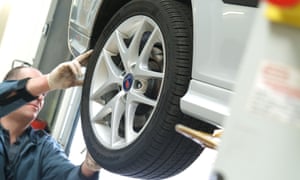We are a year into the coronavirus pandemic and, as a result of our changing lives, some of us have used our cars much less than before – the commute to work has been cancelled, as have day trips and journeys to see family and friends. But others have been driving more to avoid public transport. Whichever camp you fall into, there could be a way to cut costs.
Ask your insurer for a refund
Insurance is one of the big costs in keeping a car on the road, with the average price of a fully comprehensive policy at a four-year low of £465, according to the Association of British Insurers’ motor insurance premium tracker.
One factor that affects the cost is how far you drive. Over the past year, 49% of drivers have reported a big drop in mileage, according to the RAC, with 75% citing Covid-19 as the reason.
If you are doing fewer miles you may be able to get a refund. More than 220,000 policyholders have signed up to Direct Line’s Mileage MoneyBack scheme. If your annual mileage is less than predicted when you took out the policy, you can get 2% back for every 1,000 miles you didn’t drive, up to a maximum of 20% of the total cost. Aviva and Sheilas’ Wheels are among other insurers with refund schemes.
The Association of British Insurers advises that you speak to your insurer because “in terms of any premium refunds, this is up to individual insurers and some may be able to readjust premiums based on reduced mileage”.
Pay per mile

When it comes to renewal, if a lower mileage is your “new normal” you could save money by buying a “pay-per-mile” policy.
This isn’t the same as a “pay-as-you-go” policy, which typically provides short-term cover, usually up to 28 days.
By Miles offers this type of cover. As its chief executive, James Blackham, says, it “offers a way to save money while your car’s parked up during lockdown”. Its policies, he says, are designed to work best for those who drive under 7,000 miles a year (or about 150 miles a week).
A test run by Guardian Money, based on the scenario of a 45-year-old woman from Hertfordshire doing 5,000 miles a year driving a Peugeot, found By Miles cheapest on comparison sites at £302 a year, with the next best £318 from LV=.
The policy price includes an annual charge to cover damage or theft while parked, plus a per-mile rate of 5-6p, calculated on a monthly basis using a plug-in tracker.
Job switch savings
A change in job can mean cheaper premiums, and while most policy changes usually incur an admin charge of up to about £35, many insurers are waiving them.
Ryan Fulthorpe, a motoring expert from the price comparison site GoCompare.com, says: “If you get a new job, you should let your insurer know, as this could save money, especially if you no longer need business use but only commuting and social and domestic cover.”
Go off-road

If you are not using your car, you can declare a Sorn (statutory off-road notification) to the DVLA and get a refund for any full remaining months of tax you have paid. You can apply online at www.gov.uk/make-a-sorn. Doing this means your car can no longer be parked or driven on the road and should be in your garage or driveway.
Do make sure you pay tax before getting behind the wheel again (unless you are driving to or from a pre-booked MOT), or you risk a fine of £2,500 and prosecution.
Strip down breakdown cover
Depending on your situation, you can also save by paring down breakdown cover from a full package, which may include onward travel or European cover, to basic roadside assistance and home start.
Green Flag can arrange a pro-rata refund for the remainder of your policy, the AA will allow you to pause membership from one month up to five years, and the RAC encourages members to get in touch to discuss options, especially if finances are tight.
Repairs and servicing

MOT, servicing and repair centres can stay open as they count as “essential services”.
Servicing is not a legal requirement and prices vary according to outlet and location. A full service typically costs £150 upwards, plus any repairs. The car you drive may affect the price. As a very rough guide, those with an engine size of less than two litres may have cheaper servicing costs than larger vehicles.
The AA and RAC recommend a full service every 10,000-12,000 miles, or annually, depending on which comes first.
Even if you have not clocked up many miles, according to the AA’s Jack Cousens, “it’s still worth having a service even if the car is rarely used as there can be the risk of brakes seizing or reduced battery power, and a service can save you a bigger repair bill further down the line”.
Failure to have a service could invalidate your breakdown cover. With LV=, for example, terms and conditions state: “Vehicles must be in a roadworthy condition and should be serviced and maintained in line with the manufacturer guidelines.”
MOT rules
Unlike the first lockdown, when drivers got six months’ grace on their MOT, this time round there is no extension.
Cousens says that if your MOT expires “the only reason you can legally drive your vehicle on the road is to a pre-booked MOT test”, and if you are unwell or shielding, many operators offer a collect and delivery service.
When it comes to test fees, you can pay up to £54.85, although some garages advertise lower rates. Kwik-Fit advertises MOTs from less than £30 if you book online and Mr Clutch’s prices start at £28.
Council-run MOT centres (set up to test their own vehicles) will charge the full £54.85 and don’t do repairs. This may reassure you that any reported faults are genuine, and force you to shop around for any work that needs doing.
